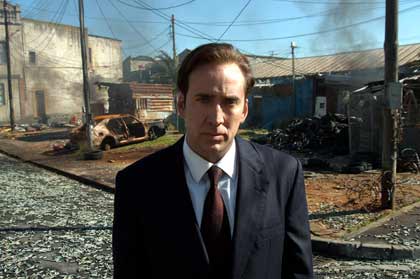

|
Lord Of War
5 out of 10 |
 |
|
Arming The Third World Written and directed by the often controversial Kiwi Andrew Niccol, "Lord of War" depicts the dark underworld of the international arms trade. Hard-hitting, it recounts the life of fictional Ukranian immigrant Yuri Orlov (Nicholas Cage) who becomes the arms trader of choice to militia groups and dictators in countries around the world. Although a smart and provocative production, from an opening scene following a bullet from it's creation in a US factory to an African war zone, it bears an eerie resemblance to Ted Demme's "Blow," and continues in similar style with the recollections from childhood and the early days of crime to their lives of luxury and success. Sadly, where Demme's film contains a compelling plot and well-developed characters, Niccol's "Lord of War" is overly concerned with Yuri's conscience and with an underdeveloped story and script, it is more of a contrived tragedy. Like a lucid dream, it wanders through the shadows of Orlov's mind as he travels from America to foreign locals and often what could be exciting, loses it's impact in lecture. The ultimate salesperson, Yuri becomes the supplier for "every army but the salvation army." Raised on the mean streets of Brooklyn's Little Odessa, with a burning desire for fame and fortune, Orlov seeks an escape from his parents' life of poverty and anonymity and choosing instead the glamour and quick money of the arms trade. He goes into business with his impulsive and impressionable younger brother Vitaly (Jared Leto), supplying weaponry to local New York mobsters, followed by international clients, including infamous Liberian warlord Andre Baptiste Sr. A philosophic and sympathetic, although unapologetic character during even his most unconscionable acts, Cage is at least good as Orlov, whilst once again the villain in "Lord of War" is a Brit. Depicting real life warlord Andre Baptiste Sr., Eammon Wright, a stalwart of early 1990's British sitcoms is faultless as the unpredictable and brutal Baptiste and delivers some of the most memorable lines, including the one from which the movie derives it's title: "They say that I am the lord of war, but perhaps it is you." Sadly, due to pregnancy, Monica Bellucci had to be replaced by a lackluster Bridget Moynahan as Yuri's wife supermodel Ava Fontaine; a move that didn't work in the films favour and was as disappointing as replacing Nicholas Cage with Jackie Chan. Often difficult to watch, it has a tone similar to "Traffic" or "The Constant Gardener," creating an image of a world that is both despicable and enthralling. Niccol, who often tries to make thoughtful movies not aimed to please filmgoers or the studios, has attempted to create a picture that would confront issues and realities often avoided outside of the evening news. They say, "The Devil has all the best tunes." and it is the dark humour, cynicism and perceptive commentary that surrounds this most charming of demons that packs such a punch. Not only exploring the concept of morality in the world of the arms trade, Niccol also paints a picture of the compassionless and unstable atmosphere under which many suffer in war torn countries throughout the world. Similar to selling banned pesticides to
Third World countries or exporting cocaine to
the USA, Orlov's attitude reflects that of international trade without
empathy or conscience for those who are victims of circumstance. Whilst
so many live in danger and poverty, those providing the means of misery
become wealthy and powerful. Possibly with "Lord of War,"
if unable to accomplish anything else, Niccol hopes to awaken some of
our consciences to change the future.
Film Critic: Jennifer M Lillies
|
|